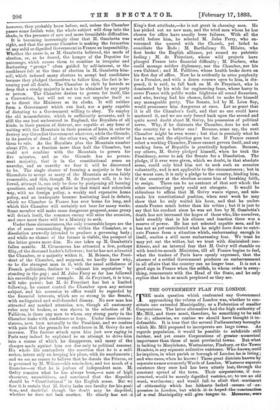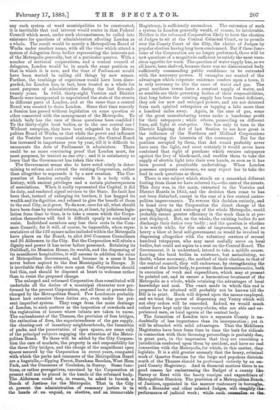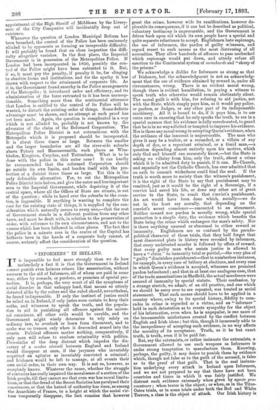THE GOVERNMENT PLAN FOR LONDON.
THE main question which confronted any Government approaching the reform of London was, whether to eon- . stitute one extended Municipality, or a Federation'of smaller Corporations. The latter alternative hadthe high- authority-of Mr. 'Mill, and there must, therefore, be. something to lie said. for 'it; otherwise, we confess we should have thought it in- defensible. It is true that the several Parliamentary boroughs which Mr. Mill proposed to incorporate are large towns. As regards population, it would be possible to subdivide still further, and yet create Corporations of greater '-numerical importance than those of, most provincial towns. Butewhat is lacking to Marylebone, Westminster, Finsbury, or the Tower Hamlets, is any separate collective existence. Who--knows;until he inquires, in what parish or borough of London he is living ; and who cares, when he knows? These great districts knowirby separate names are merely Wards of London. Whatever separate existence they once had has been utterly lost, through the constant spread of the town. Their corporations, 'if con- struoted, would be merely dignified vestries, or, to use an old -word,- wardmotes ; and would fail. to elicit that -sentiment of .citizenship which has hitherto lacked qmeans. of ex- pression in London, but which' it is -hoped,:the rconstruction of w real Municipality will give -tongue' to. Moreover, were
any such system of ward municipalities to be constructed, it is inevitable that real interest would centre in that Federal Council which must, under such circumstances, be called into existence for questions of administration affecting London as a whole. The result would be merely a Metropolitan Board of Works under another name, with all the vices which attend a system of delegation from bodies representing the interests not of the Metropolis generally, but of a particular quarter. With a number of sectional corporations, and a central council of delegates, London would be in much the same position as that in which it is now, and the time of Parliament would have been wasted in calling old things by new names. Further, the teachings of experience would have been disre- garded, for London has, in fact, been treated as a whole for most purposes of administration during the last five-and- twenty years. In 1855, thirty-eight Vestries and District Boards were incorporated to superintend the state of the streets in different parts of London, and at the same time a central Board was created to drain London. Since that time scarcely a Session has passed without legislation on some question or other connected with the management of the Metropolis. To which body has the care of these questions been confided ? To the thirty-eight local bodies, or to the one central one ? Without exception, they have been relegated to the Metro- politan Board of Works, so that while the power and influence of the Vestries have remained stationary, the Central Board has increased in importance year by year, till it is difficult to enumerate the Acts of Parliament it administers. There could be no more convincing proof that London must, for most purposes, be treated as one city ; and it is satisfactory to learn that the Government has taken this view.
The Government seems also to have acted wisely in deter- mining to reform and extend the existing Corporation, rather than altogether to supersede it by a new creation. The Cor- poration of London actually exists. It is a body with a history, with ancient privileges and a certain picturesqueness of associations. When it really represented the Capital, it did its duty, and rendered signal services to the State. Its fault has been that, instead of enlarging its borders, it has hugged its wealth and its dignities, and refused to give the benefit of them to the real City, as it grew. To do now, once for all, what should have been done by internal reform, or, at least, by judicious legis- lation from time to time, is to take a course which the Corpo- ration themselves will find it difficult openly to condemn or resist. Individual members may lose their seats in the Com- mon Council; for it will, of course, be impossible, when repre- sentatives of the123 square miles included within the Metropolis have places on the Board, to allot 206 Common Councilmen and 26 Aldermen to the City. But the Corporation will attain a dignity and power it has never before possessed. Retaining its Guildhall, its Mansion House, its wealth, and the dispensing of its munificent hospitalities, it will assume in addition the reins of Metropolitan Government, and become in a sense it has never before aspired to the first Municipality in Europe. It is inevitable that the abler men upon the Corporation should feel this, and should be disposed at heart to welcome rather than to resist the proposed change.
The enlarged and reformed Corporation thus constituted will undertake all the duties of a municipal character now per- formed by the present Corporation, and all those at present dis- charged by the Metropolitan Board. Few Londoners probably know how extensive these duties are, even under the pre- sent imperfect system. They range from the main drainage of London, to such matters as the inspection of cowsheds and the registration of houses where infants are taken to nurse. The embankment of the Thames, the provision of free bridges, the extinction of fires, the superintendence of the gas supply, the clearing-out of insanitary neighbourhoods, the formation of parks, and the preservation of open spaces, are some only of the principal subjects engaging the attention of the Metro- politan Board. To these will be added by the City Corpora- tion the care of markets, the property in and responsibility for the three City bridges, and the charge of the magnificent open spaces secured by the Corporation in recent years, compared with which the parks and commons of the Metropolitan Board are a bagatelle,—Epping Forest, Burnham Beeches, West Ham Park, and. the Commons of Couladon, in Surrey. Some func- tions, or rather prerogatives, exercised by the Corporation at present will. not be placed in the hands of the reformed body. The Aldermen - could not,, in reason, be asked to furnish a Bench of Justices for the Metropolis. That in the City at present the administration of summary justice is in the hands of, an, unpaid, an elective, and au irremovable Magistracy, is sufficiently anomalous. The extension of such a system to London generally would, of course, be intolerable. Neither is the reformed Corporation likely to have the election of Judges to sit at the Central Criminal Court, or to preside over the County Court of the City, the choice of Judges by popular election having long been condemned. But if these func- tions of the Corporation are no longer performed, there will be new questions of a magnitude sufficient to satisfy the most vora- cious appetite for work. The question of water supply has, as we all know, been shelved, because there was no disinterested body sufficiently commanding public confidence to be entrusted with the necessary powers. If examples are wanted of the advantages which corporate existence confers upon a town, it is only necessary to cite the cases of water and gas. The great northern towns have a constant supply of water, and so sensible are their governing bodies of their responsibilities, that long before the existing supply has been found deficient, they ask for new and enlarged powers, and are not deterred from such spirited enterprises as tapping a lake more than a hundred miles away. Again, in the case of gas, some of the great manufacturing towns make a handsome profit for their ratepayers ; while others, proceeding on different lines, sell light at cost-price. .One has only to turn to the Electric Lighting Act of last Session to see how great is the influence of the Northern and Midland Corporations in protecting the interests of the consumer. But for the position occupied by them, that Act would probably never have seen the light, and most certainly it would never have contained that right of purchase which secures ratepayers against the levy of black-mail, and enables them to take the supply of electric light into their own hands, as soon as it has been proved a practicable undertaking. When London possesses corporate existence, we may expect her to take the lead in such questions as these.
There is one subject which stands on a somewhat different footing from those we have referred to,—the care of the streets. This duty was, in the main, entrusted to the Vestries and District Boards in 1855, and the decision then come to has not been disturbed, except in the case of a few central metro- politan improvements. To reverse this decision entirely, and to hand over to the Corporation .the direct charge of the paving, lighting, and watering of the whole Metropolis, would probably ensure greater efficiency in the work than is at pre- sent displayed. But, on the whole, the existing bodies do not discharge their duties very badly ; and the question is whether it is worth while, for the sake of improvement, to deal so heavy a blow at local self-government as would be involved in dispensing altogether with the voluntary services of several hundred ratepayers, who may most usefully serve on local bodies, but could not aspire to a seat on the Central Board. The Government, it is understood, intend to take a middle course. Leaving the local bodies in existence, but assimilating, no doubt, where necessary, the method of their election to that of the central council, they will endeavour, by strengthening the control of the latter body, to prevent those inconsistencies, both in execution of work and expenditure, which may at present be pointed out, and to ensure a harmonious treatment of the Metropolis as a whole, while retaining the advantages of local knowledge and zeal. The exact mode in which this end is proposed to be attained will probably not be known till the Bill is in print. Much will depend upon the means employed, and we trust the power of dispersing any Vestry which will. not obey orders will be conceded. Indeed, we would much. rather have kept only the vestry-clerks, who are able and ex- perienced men, as local agents of the central body.
The formation of London into a separate County is un- doubtedly of less importance than its incorporation ; yet it will be attended with solid advantages. That the Middlesex Magistrates have been from time to time the butt for ridicule in connection with their licensing proceedings is probably due, In great part, to the impression that they are exercising a jurisdiction conferred upon them by accident, and have no real connection with the Metropolis, for which, in this matter, they legislate. It is a still greater anomaly that the hew, criminal work of Quarter Sessions for the large and populous districts south of the Thames should be performed entirely by an un- paid County Magistracy. And in financial matters there lane good reason for embarrassing the Budget of a, county like Haney ar Sent with the heavy receipts and expanditere of , MetropolitanDistrie,ta. The provision of a Metropolitan Ben& of Justices, appointed in the manner customary in boroughs, with a Recorder 'and. other salaried Judges, will Amplify the, performance of judicial work ; whUe such. anomalies, as the,
appointment of the High Sheriff of Middlesex by the Livery- men of the City Companies will incidentally drop out of existence.
Whenever the question of London Municipal Reform has been broached, the control of the Police has been ominously alluded to by opponents as forming an insuperable difficulty. It will probably be found that on close inspection the diffi- culty altogether vanishes. In the first place, the Imperial Government is in possession of the Metropolitan Police. If London had been incorporated in 1830, possibly the con- trol of the Police might have been entrusted to it. But, if so, it must pay the penalty, if penalty it be, for clinging to obsolete forms and institutions, and for the apathy it has shown with respect to the attainment of corporate life. As it is, the Government found anarchy in the Police arrangements of the Metropolis ; it introduced order and efficiency, and its administration of the force entrusted to it has been unexcep- tionable. Something more than the sentimental utterance that London is entitled to the control of its Police will be wanted, to disturb the existing order of things. Some definite advantage must be shown, and no attempt at such proof has yet been made. Again, the question is complicated in a way which is not alluded to probably is not known by, the advocates of the claim of the Reformed Corporation. The Metropolitan Police District is not coterminous with the Metropolis which it is proposed should be incorporated. It is about three times as large. Between the smaller and the larger boundaries are all the river-side suburbs above Putney and Hammersmith, such places as Wim- bledon, Kingston, Croydon, and Tottenham. What is to be done with the police in this outer zone ? It can hardly be recommended that the reformed Corporation should go outside its own limits, and burden itself with the pro- tection of a district three times as large. Yet this is the only defensible alternative. For, to cut the Metropolitan Police District into halves, and give the outer and less important area to the Imperial Government, while depriving it of the central space, where all the Offices of State are situate, is out of the question ; while to hand over the suburbs to the coun- ties, is impossible. If anything is wanting to complete the case for the existing state of things, it is supplied by the con- sideration which naturally occurs to every one,—that the seat of Government stands in a different position from any other town, and must be dealt with, in relation to the preservation of order, with reference to its own circumstances, and not to the course which has been followed in other places. The fact that the police in a minute area in the centre of the Capital has hitherto been in the hands of a corporate body cannot, of course, seriously affect the consideration of the question.
















































 Previous page
Previous page